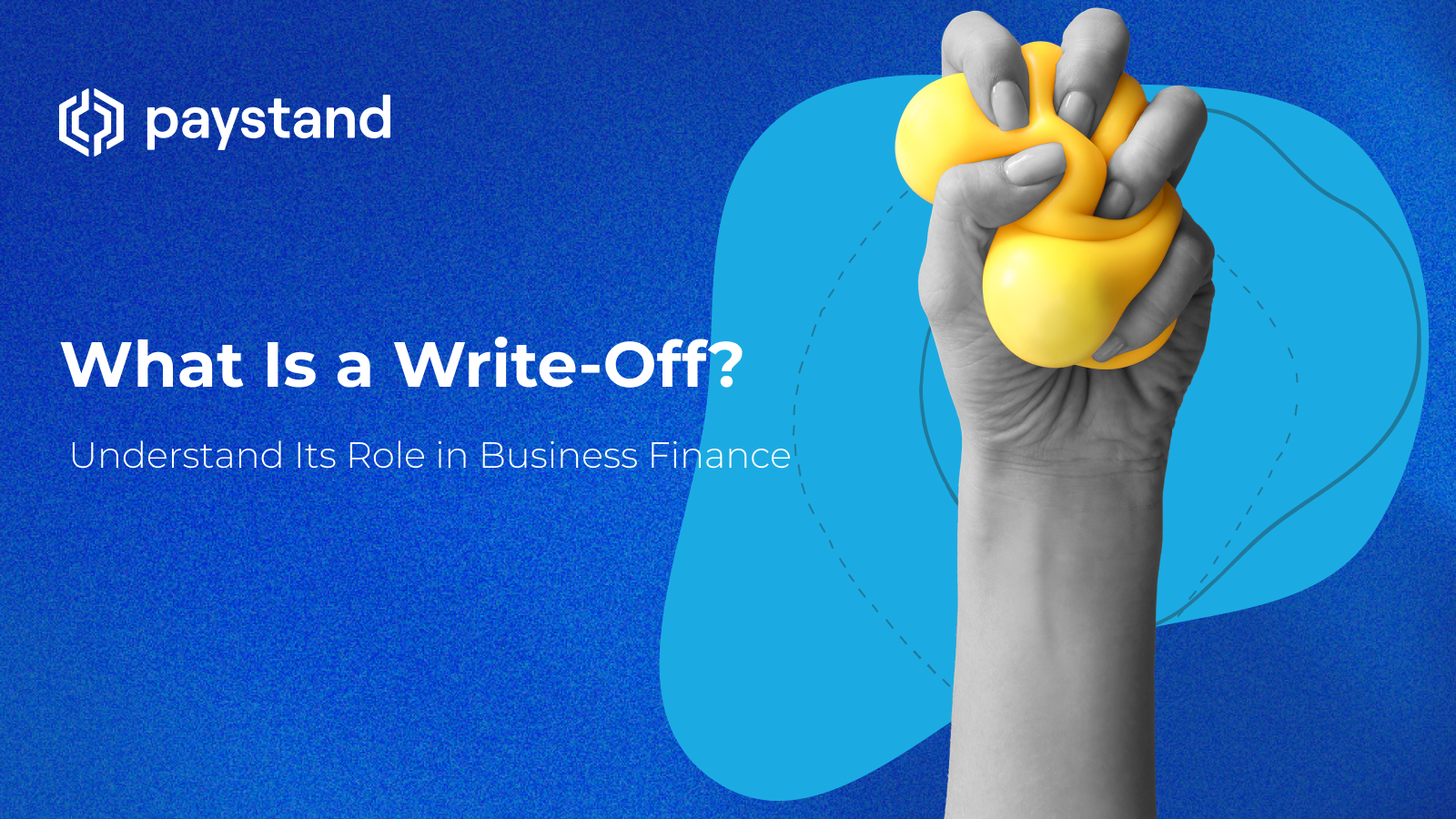What Is a Write-Off? Understand Its Role in Business Finance

Table of Contents
- What Is a write-off, and how does it work?
- What are the reasons for a write-off?
- What happens when your debt is written off?
- Simplify and optimize with Paystand
Key Takeaways
- Write-offs are essential accounting processes that recognize and record unrecoverable expenses or losses, maintain accurate financial records, and ensure compliance with accounting standards.
- Reasons for write-offs include bad debts, obsolete inventory, impaired assets, and unrecoverable costs, all of which impact financial statements.
- Debt write-offs can provide financial relief but may result in negative credit score impacts, collection efforts, legal actions, and potential tax liabilities.
- Managing and understanding write-offs is vital for maintaining accurate accounts and ensuring effective accounts receivable management.
Effective financial management goes beyond monitoring profits. It requires a deep understanding of accounting principles, such as write-offs. Mastering this process is crucial for maintaining accurate financial records, mitigating risks, and ensuring compliance with regulatory standards.
Ready to explore the mechanics of write-offs and how they shape the foundation of effective business financial management? Keep reading to learn more about their implications, processes, and strategic importance for your company’s financial operations.
What Is a Write-Off, and How Does it Work?
A write-off is an accounting practice that recognizes expenses or losses deemed unrecoverable. It removes the asset or debt from the balance sheet and records the loss on the income statement, ensuring accurate financial reporting.
The process generally involves:
-
Identification: Pinpoint the asset or debt requiring a write-off through a detailed analysis of its value and recoverability.
-
Authorization: Secure approval from appropriate personnel, such as management or the board of directors.
-
Accounting Entry: Record the write-off by debiting an expense account and crediting the asset or debt account.
-
Disclosure: For significant write-offs, disclose them in financial statements to provide transparency.
There are several different types of write-offs, including:
- Bad debt write-off: This occurs when a company determines that a customer's debt is uncollectible. The debt is removed from the accounts receivable balance and recorded as an expense.
- Inventory write-off occurs when inventory becomes obsolete, damaged, or otherwise unsaleable. The inventory is removed from the balance sheet and recorded as an expense.
- Asset write-off: This occurs when a fixed asset loses its value or becomes unusable. The asset is removed from the balance sheet and recorded as an expense.
What is a Tax Write-Off?
A tax write-off reduces taxable income by accounting for specific business expenses or losses. This process helps businesses of all sizes minimize their tax obligations by deducting allowable costs, such as bad debts or impaired assets, from their earnings.
What is the Difference Between a Write-Off and a Write-Down?
A write-off eliminates an asset's remaining value, while a write-down reduces its book value when the market value falls below its carrying amount. Write-offs are typically used when an asset's value is entirely unrecoverable.
What Are the Reasons for a Write-Off?
Write-offs are common for companies offering credit or managing inventory. They should be documented carefully, as they can impact financial statements and indicate financial distress. However, they can also ensure accurate records.
There are several reasons why a company might decide to write off an asset:
- Bad debts: Unrecoverable amounts owed by customers.
- Obsolete inventory: Unsaleable stock caused by damage or market changes.
- Impaired assets: Assets losing value due to market or operational factors.
- Unrecoverable costs: Expenses from canceled projects or terminated contracts.
What Happens When Your Debt Is Written Off?
When a debt is written off, the creditor ceases collection efforts, but the debtor may still face consequences:
- Credit score impact: The write-off remains on credit reports for up to seven years.
- Collection efforts: Debts may be sold to collection agencies, which can pursue repayment.
- Tax implications: Written-off amounts may be considered taxable income.
- Legal actions: Creditors or collection agencies might initiate lawsuits or garnishments.
Is Writing Off Debt a Good Idea?
Debt write-off involves a creditor canceling a portion or all of the outstanding debt, which can provide financial relief, a fresh start, and an alternative to bankruptcy. However, it can also lead to tax implications, a negative impact on credit scores, negotiation challenges, and moral hazard. Before pursuing a debt write-off, consider the type of debt, financial situation, and alternative debt relief options. Consult with a financial advisor or debt counselor for personalized guidance.
What Happens When Your Account Is Written Off?
When an account is written off, the creditor has given up on collecting the debt. This negatively impacts the debtor's credit score and can result in continued collection efforts by collection agencies or legal action.
Long-term consequences include financial difficulties, limited opportunities, and psychological distress. Potential tax implications, the statute of limitations on debt collection, and the possibility of debt settlement should be considered. Seeking professional guidance can be beneficial in managing the situation and rebuilding financial stability.
Simplify and Optimize with Paystand
Simplify your financial workflows with Paystand! Our cloud-based solution automates payments and streamlines accounts receivable management, freeing up time for what matters most. Ready to transform your financial processes? Download our exclusive eBook, Controller’s Guide to B2B Payment Optimization, and see how Paystand can elevate your business strategies.





